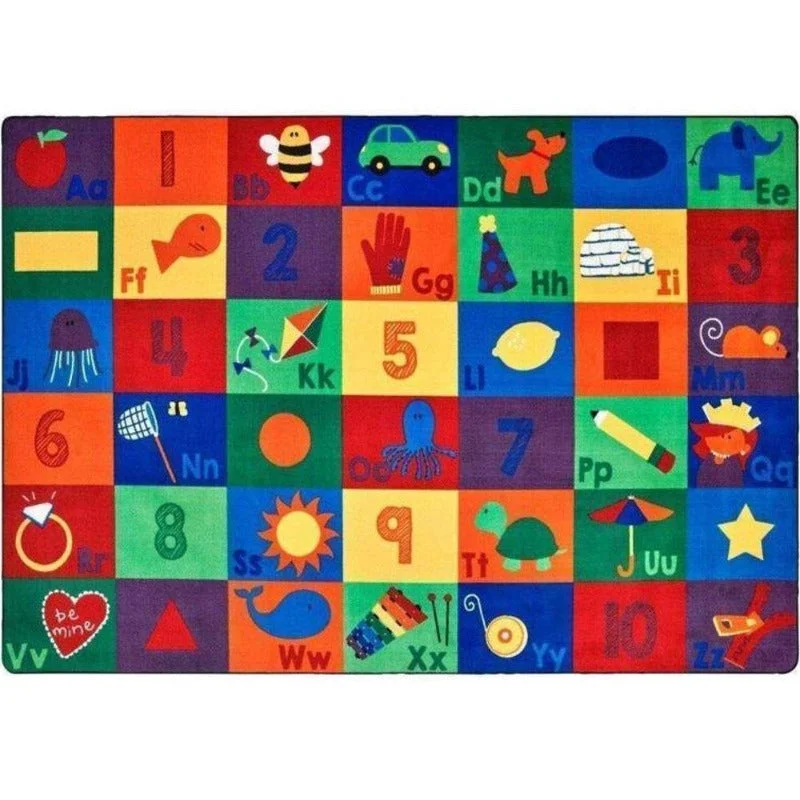The Sequential Seating Literacy Rug features upper and lower case letters with a matching icon in each square. The colors pop off the rug and will get children excited about learning.
Sizes:
- 6' x 9' Seat Size 15.5" x 12"
- 8' x 12' Seat Size 20 1/2" x 16"
- 8'4 x 13'4 Seat Size 23" x 16.5"
The numbers and everyday icons make this a great multipurpose rug that can be used for a variety of lessons and a great tool to encourage learning. Getting children out of their seats and letting them get the wiggles out will help you have a class excited about education.
About : We have been given access to a small inventory of irregular classroom-style rugs that do not meet the rigid first quality standards of Carpets for Kids.
This is a brand new rug that may include a slight color change, small dye spots, a slight backing flaw or a seam that hasn't been sewn perfectly straight.
- Anti Static Protection
-
Meets NFPA 253, Class 1 Firecode
- Double-stitched serged edges
- Carpet stain protection
- Assists in allergen particle control
- Meets the CRI s Green Label Plus certification
Made by Carpets for Kids
"Alphabet and Number Treasure Hunt" (Age: Kindergarten - 1st Grade)
Objective:
Students will practice letter recognition, phonics, counting, and simple problem-solving by engaging in a treasure hunt using the rug’s squares as clues.
Materials Needed:
- The Sequential Seating Rug
- Small "treasure" items (could be stickers, small toys, or tokens)
- Clue cards for letters and numbers
- A small box or container for the treasure
Instructions:
-
Preparation:
- Place a small treasure item under or near specific squares on the rug.
- Prepare a set of clue cards, each one referencing a specific letter, number, or image on the rug. For example, “Find the square with the buzzing insect!” (for "B" and the bee).
-
Step 1: Introduce the Treasure Hunt
- Explain to the students that they are going on a treasure hunt! You’ll give them clues, and they need to figure out which square on the rug the clue refers to.
-
Step 2: The Hunt Begins
- Call out a clue that corresponds to one of the squares on the rug.
- For example, “I’m thinking of a letter that comes after A and sounds like ‘buh’!” (Answer: B).
- Or, “Find the number that comes after 3 but before 5!” (Answer: 4).
- Call out a clue that corresponds to one of the squares on the rug.
-
Step 3: Searching and Discovering
- The student who correctly identifies the letter, number, or object from the clue can go to that square to check for a treasure.
- If they find the treasure, they can bring it back to their seat and the next clue is given.
- If the treasure isn’t there, another student has a chance to guess.
-
Step 4: Incorporate Phonics and Counting
- For additional fun, ask the students to say the sound of the letter or count up to the number they’ve found before they check for treasure.
- For example: “Can you count to 4 before checking the square?”
-
Step 5: Team Play
- For larger groups, you can turn it into a team activity. Split the class into two teams, and whichever team finds the most treasures wins a special reward (like extra playtime or a class sticker).
Bonus Activity: You can also create more challenging clues for older students by adding riddles or making them solve basic math problems to unlock the next clue. For example, “What is 3 + 2? Now find the square with that number!”
This treasure hunt keeps students active and engaged while they practice letters, numbers, and thinking skills. Plus, the excitement of finding treasure adds a fun and rewarding twist!

